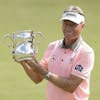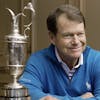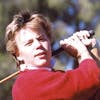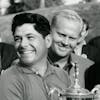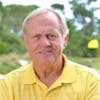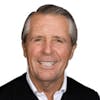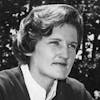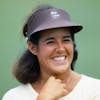Justin Leonard - Part 3 (The 1999 Ryder Cup)
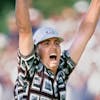
In this thrilling conclusion of a three-part series with Justin Leonard, listeners are invited to embark on a journey through Leonard's professional career from 2000 onward. An episode filled with vivid insights and reflections, Leonard shares his experiences playing in the Dunhill Cup, the World Cup, and the improbable putt he made at 1999 Ryder Cup at Brookline, an event etched in golfing history.
Leonard opens up about his time playing alongside legends like Davis Love III and Jim Furyk, and his transition into broadcasting, providing a glimpse into the steep learning curve and the joy he found in this new avenue. He details the evolution of his analysis and the challenges he faced in adapting to the unique rhythm of televised golf commentary. His stories are seasoned with humor, wisdom, and a deep respect for the game.
A particularly poignant moment arrives as Leonard reflects on his "career mulligan" at the 2004 PGA Whistling Straits, a candid admission that resonates with anyone who's felt the weight of a single decision. The hosts, Mike Gonzalez and Bruce Devlin, steer the conversation with warmth and understanding, tying in their shared experiences and engaging Leonard in a discussion that feels both intimate and universal.
The episode concludes with Leonard answering the hosts' signature three questions, offering insights that transcend golf, touching on themes of perfectionism, grace, and the importance of treating people the right way. His perspective is a testament to a career well-played and a life well-lived.
Join Mike, Bruce, and Justin Leonard for a final round that is as entertaining as it is enlightening, offering lessons on the fairways and beyond. Whether a golf enthusiast or simply interested in the life stories of those who have mastered their craft, this episode promises a captivating look at one man's path through professional golf, broadcasting, and life. Subscribe to our podcast to enjoy this episode and many more as they continue to celebrate the world of golf, "FORE the Good of the Game."
Follow our show and/or leave a review/rating on:
Our Website https://www.forethegoodofthegame.com/reviews/new/
Apple Podcasts https://podcasts.apple.com/us/podcast/fore-the-good-of-the-game/id1562581853
Spotify Podcasts https://open.spotify.com/show/0XSuVGjwQg6bm78COkIhZO?si=b4c9d47ea8b24b2d
Google Podcasts https://podcasts.google.com/feed/aHR0cHM6Ly9mZWVkcy5idXp6c3Byb3V0LmNvbS8xNzM3Mjc1LnJzcw
About
"FORE the Good of the Game” is a golf podcast featuring interviews with World Golf Hall of Fame members, winners of major championships and other people of influence in and around the game of golf. Highlighting the positive aspects of the game, we aim to create and provide an engaging and timeless repository of content that listeners can enjoy now and forever. Co-hosted by PGA Tour star Bruce Devlin, our podcast focuses on telling their life stories, in their voices. Join Bruce and Mike Gonzalez “FORE the Good of the Game.”
Thanks so much for listening!
Music playing 00:00
Mike Gonzalez 00:15
You had a chance to win. A little team deal, I guess in 2000. Bruce
Devlin, Bruce 00:22
He did. That was the CVS Charity Classic was it?
Leonard, Justin 00:30
Yeah, yeah, that was Brad Faxon and Bill Andrade's event. I think I was maybe with Davis. I think Davis and I were partners there for a few years. And, you know, just a fun two day deal. It's all for you know, not all for charity, but mostly for charity. And I played it for a number of years. Those guys did a great job raise a bunch of money for you know, a lot of great charities up in New England and and I think Davisand I, yeah, we prevailed that year
Devlin, Bruce 01:00
You beat you beat a couple of characters to remember who you beat?
Leonard, Justin 01:05
I don't remember who we beat
Devlin, Bruce 01:07
Elky and Stads.
Leonard, Justin 01:09
Oh, yeah, yeah, that sounds familiar. Yeah, that was a fun those deals were always a fun couple of days where you're just you know, I remember the format if it was a scramble or a basketball or something but yeah, those are fun.
Mike Gonzalez 01:23
What must have been fun for you to win the 2000 Texas Open
Leonard, Justin 01:28
it was it was there at La Cantera you know, the Texas Opens always kind of had a special place in my career. I mentioned earlier about kind of locked up my tour card there and 90 for the next year. I think I finished second to just get into the Tour Championship. And you know, then to go on and win there. I think that was the first time that I won there at lock and Terra but you know, always nice to kind of be close to home and be able to drive down to San Antonio and play and even more fun when you go down and play well.
Mike Gonzalez 02:13
Yeah, you went low there 19 under with some sporty rounds, and then back to back the following year. You come back and win there again this time instead of by five over Mr. Wiebe. It was my to over JJ Henry and Matt Kuchar.
Leonard, Justin 02:30
Yeah, and I think that was one of those years Joe LaCava caddied for me. I was kind of in between caddies and and Joe, I gave Joe a call. And he said, well, because I'd won the year before. He said, Well, can you win this thing again? And I said, Well, yeah, I can't. I don't know if I will. But I can. I think I might have told him I will. At least it was funny. It was just a couple of weeks ago. His son is now carrying a little bit he reminded me of that story. And so anyways, I guess I guarantee Joe win and we got it. So it was fun.
Mike Gonzalez 03:08
Yeah, you must have liked that Golf Course. Then you come back and win the heritage the following year 2002 course that's close to home here where I'm at Hilton Head Island at Harbour Town. And Bruce I've got to say for anybody that wins the Heritage and wins on that Golf Course they can play
Devlin, Bruce 03:24
yes it's a great Golf Course great strikers Golf Course. Justin don't you think
Leonard, Justin 03:31
yeah, it's I mean it's claustrophobic you know, off the tee, the greens are tiny. It really does you have to shape the ball both directions, I think to play well there and, and my wife and I got married in February of 2002. So that was you know her first time to see me win. And you know, always find there especially coming off the Masters there's such build up towards the masters and and that week is you know, can be a very long and taxing week and then to be able to go just drive three hours and you feel like you're on a little bit of like spring break after final exams, being in Hilton Head so I didn't contend there as much as I thought I would over the years but it was nice to at least get a victory there at some point.
Mike Gonzalez 04:22
You go to the haunted in 2003 and win the Honda Classic of course that was sandwiched by a couple of close calls at majors because you had to you had some real chances again at the PGA Championship both in 2002 and 2004. The 2002 one was at Hazeltine, the 2004 was it Whistling Straits?
Leonard, Justin 04:43
Yeah, oh two in Hazeltine I think I had a three shot lead going the last day and over Rich Beem and I just, I just didn't play very well that day. Rich played great golf and never I never really felt like I I was never comfortable with my game or anything that day. And then fast forward a couple years oh four To me that's the one that really got away playing Whistling Straits you know, I had a one shot lead plan the 72nd hole, hit a good drive, if you remember that that green is it's almost a bit like a clover shape and, and the pen was kind of over on the left I hit a five iron and right at the middle of the green I kind of hit the shot I wanted to and it just didn't carry this little indention that kind of went into the green that way and and I didn't hit a very good chip you know or pot and and then ended up losing that playoff but I felt like if a firearm if I'd hit it at the flag it would have certainly carried the front edge of the grand and I probably wouldn't want a PGA championship so that Oh 4, 02 Like I just didn't play well at all that Sunday but but oh four you know that's the one that that really got away
Mike Gonzalez 06:06
yeah, that went in 2005 is probably familiar Bruce you know that place don't you places
Devlin, Bruce 06:12
and Bob have plastic at Palm Springs you bet Tim Clark and Joe Ogilvy buy three shots
Leonard, Justin 06:20
Yeah, I always enjoy going to the desert I mean especially early in the year in January the weather so good and you know back in that time we were playing Five days on four different golf courses and you know I while I want to play well I kind of looked at it as a great way to kind of get my game see where my game was going into the season. I didn't always play in Hawaii and those things so always enjoyed being in the desert and you know, I I tended I always felt like I played better on on more difficult golf courses were putting the ball in the fairway and things like that were more important but some reason it you know, certain times I could string a few low rounds together and certainly when given good greens and conditions like that because they're always perfect and Palm Springs you know, I look forward to it. The golf courses weren't very long. I didn't feel like a player mine length was it any kind of disadvantage so you know, always went out they're in pretty good, pretty good mindset.
Mike Gonzalez 07:27
Well, Justin, I know our listeners are anxious to have us get to some of your team play experience. I don't want to short your your personal career in terms of other wins. I will skip over a few and mention them but I know Bruce is going to have a question for you as well. But you went on to win the FedEx St. Jude you won that in 2005. But you also came back and won that in 2008 in between a third Texas Open again La Cantera this one and a playoff a Jesper Parnevik, but the St. Jude in 2008 was your final tour victory. I think what Bruce is going to want to ask you about is more about your playoff record.
Devlin, Bruce 08:05
Yes. I'm not sure if you're aware, Justin, but we have we've now had 74 interviews with all the great players, both men and women. Right. Do you Have you any idea what the percentage of playoff victories are?
Leonard, Justin 08:25
I don't know. But I guarantee you it's at least 30 or 40% higher than my own.
Devlin, Bruce 08:36
Your playoff victories are only two as against five losses. But right of all of these great players that we've talked to they have a playoff record of point four, three, they do not win half the playoffs that they were in which is quite remarkable. I think when you think about it, that you've all the greatest players in the world have a losing record in the playoffs. Quite, quite amazing. Yeah, that is surprising.
Mike Gonzalez 09:06
Kathy Whitworth as an example. Eight and 20.
Leonard, Justin 09:10
Wow.
Mike Gonzalez 09:11
Now think about that
Leonard, Justin 09:12
Wow it as a lot of playoffs. Oh, my goodness.
Mike Gonzalez 09:16
Yeah. So we were kind of surprised to see the stats as they were the women are just ahead of the men but 43% I suppose if you adjust for the playoffs that you're in with with more than two people? Yeah, maybe just I think it just works out to a coin flip.
Leonard, Justin 09:32
Right, right. Yeah. I you know, two majors and in playoffs and then I remember being in the playoff at it was that St. Jude against Robert Allenby and Trevor Immelman. And I think, Trevor, if I remember right, that was 2008. Trevor just won the masters that spring and If I hadn't, I think up to that point I had not won a playoff. I think I was over five at that point. And I made a I made birdie on our second playoff hold a little par 3/11. Trevor still had about a 15 footer or so. And Robert and I stand on the back of the green and I told him I see and I've never won a playoff before. I don't know if it's gonna happen here, but at least I give myself a chance. And he said he'd never lost a playoff. He was like six oh, or seven and O or something. And that included, you know, some European tour events and Australian opens and all that. But anyways, so I finally got off the shine. And then as you mentioned, I won that playoff as well in San Antonio.
Mike Gonzalez 10:45
Yeah, yeah. Well, let's go on to the Ryder Cup if we can. We talked about you qualifying for your first Ryder Cup and 97 at Valderrama course that was the one that Seve was the captain of the European side and it almost seemed with him in the in the in the captain's seat it was sort of destined I don't know what your feeling about that is because you were in the heat of battle. I know you guys were trying to win every match but you know, history will certainly reflect that it was seemed to be Seve's time as a as a leader of that team that year, but just tell us a little bit about your reflections of your first Ryder Cup.
Leonard, Justin 11:22
Yeah, 97 it was Tiger's first Ryder Cup. You know, we were the two young guys on the team. It was Jim Furyk's first and then a great you know, veterans like Brad Faxon and Davis Love and Scott Hoch and, and Freddy Couples and those guys. It was fun. But yeah, we were certainly up against it. I mean, playing in Spain Seve being the captain. You know, the whole week we had we had rain again that week, we had a couple of delays and things like that. And, you know, I think they probably had advantage over us with the Golf Course it's kind of a Valdarama as a quick a bit of a quirky Golf Course. A lot of doglegs a lot of these cork trees, which look a lot like live oaks, kind of smaller live oaks but very much in play and you get hit a ball, you know where you think oh, this is perfect in the fairway and you could be completely blocked out and so and I think they had certainly had the advantage on the experience on playing that Golf Course. And then was Seve being Seve I mean, he was everywhere that week and and I think in the end it was you know we got it you know close but that was that was going to be a tough a tough road against those guys that week.
Mike Gonzalez 12:42
Yeah, well, let's let's go to more fonder memories, which is your next Ryder Cup, one that came in the next one, which was the 1999 Ryder Cup with The Country Club at Brookline you ever get a chance to talk about this one much?
Leonard, Justin 12:55
I do. I've gotten to revisit it every couple years at NBC. And and then last year during the use open, I'm able to you know, it's fun. I was I was out doing my course prep on on Wednesday before the US Open and and I was walking up the 17th and and I was walking with and sometimes you know I like to if I find a group maybe with some caddies or players that I'm friendly with I'll just kind of follow them for a few holes and so you know as Justin Thomas and Scottie Scheffler and and you know a couple other guys and so I woke up on the green I kind of have my nose and my book I woke up in the green and and Scotty hands me his putter and he throws down a ball and bones is back there on the back of the green he throws down with those little rubber cups and they're like hey show us the pot so I you know I did it hit the five everything so so that was good fun. You know I've had a producer Tommy Royce forced me to bring the Ryder Cup shirt a couple times to Ryder cups into the US Open and and I'm gonna tell him it's you know it got lost in the move I'm gonna stop bringing that with me that if I if I do any TV events so but yeah great memories and and you know the first part of the week we just simply got outplayed it seemed like Jesper Parnevik and Sergio Garcia were were unbeatable. And you know Colin Montgomery played great Paul Laurie had a great week. You know, and I think that certainly they just kept momentum on their side and then you know, on Sunday we're able to turn it around and get a lot of momentum early on in the matches and and not just little one up leads but they were you know, guys were two and three up after four and five holes and Mark James European captain had three players he hadn't played in the team matches and they all went out very early in the singles matches, like all three of them in the first five matches and so we had to front end front load our lineup and, and try and get some momentum going and we did that and it you know, just it worked out beautifully.
Mike Gonzalez 15:19
Yeah, so we're gonna get to Sunday, let's just set it up for our listeners a little bit because you've got you got Ben Crenshaw, as, as Justin mentioned, noted, golf historian is probably an understatement. The captain of the US side, he had an early trip as a as a young man with his father to Brookline. And he said that was he told us in his interview, that was probably the time when I really did get interested in the history of the game. And of course, you remember, the young man that grew up across from the 17th hole, Francis Ouimet as a young kid caddies, there, he goes on to win as an amateur, the 1913 US Open, beating Harry Ward and Ted Ray. So there's a lot of famous history there. There's history there from 2000. From from 1913. to the to the the year of this is Ryder Cup, which I won't go through, but, but it just there was a lot of importance there. And, you know, as you got into the Saturday night speech of Ben, we'll kind of get into that. But I want to, I want to just ask you a little bit about about Saturday, because in the four ball you were playing in Saturday afternoon with with this fellow.
Sutton, Hal 16:34
And so we squared the match up right there, to even and of course, we got the T going into 17. And both of us drove it right down the middle of the fairway. And, you know, osafo hits that way. Right. And, I mean, Jimenez does, and Olazabal has just kind of snappy hook out there. And they're both and rough. And So Justin, run it off the tee and I'm hollering at Justin, Justin, just a minute, just a minute. And I had to run up there to catch him. He won't stop, you know, and run up there. And I said, Hey, look, man. I said I just I see the stage set. And he said, What are you talking about? I said, you want the best web players in the world. pump him up. I said game. Oh, this is your whole right here. Best wedge player in the world. I was a day off the next day was the stage was set for the next day. On 17.
Mike Gonzalez 17:32
You remember any of that?
Devlin, Bruce 17:34
It's pretty fun.
Leonard, Justin 17:34
I do. Yeah. Get to play with Hal that was something else. And he got it made a great up and down at 18 from the front bunker. You know, in that match? Yeah, it was, you know, I played I got to play with Payne Stewart. That week and a match. But yeah, I mean, playing with how he was great. I mean, he was he was a playing Captain. Because of you know, conversations like that. Just a great teammate. fun to be around.
Mike Gonzalez 18:09
So let's, let's kind of set it up for Sunday. Of course, you mentioned you guys didn't play great early. I think you were down what 10? six or so? Yes, yeah. 10 Six, one the last day. So you know, you mentioned that the the captain decides to front end the lineup, which he did. He opens up with Lehman, Sutton Mickelson, Love, Woods and Duval right out of the box. But take us back to Saturday night, we understand. George W might have made an appearance, reading a little story about the Alamo course Ben knew President Bush at the time, maybe Governor Bush quite well. And of course, his famous quote, as part of that speech. Tell us a little bit about that. Just take us into the room that Saturday night.
Leonard, Justin 18:57
Yeah, so, you know, I think we were licking our wounds a bit on Saturday night. And until we, you know, we kind of had our strategy set in place before the players left the Golf Course. And then, you know, once we kind of said, Okay, here's our order. Then we all went back to the hotel and then still had to do the, you know, the pairings revealed and he had to do his press. And so we were actually at the hotel when Ben was giving, you know, was in the media room and, and we saw the pairings we thought, okay, this might, you know, look somewhat doable. And, and, and then, you know, Ben and his famous words, he was kind of tired of taking questions. And he said, Listen, I, you know, I've got one more thing to say, and I've got a good feeling about this. And that's, I'm just gonna leave you with that. Kind of thought he was nuts at the time. But looking back, he knew what he's talking about. I mean, Ben's very he'd like touchy feely, it's in the it's in the clouds and the trees and the stars. He understood better than anybody. The significance of what Francis Ouimet accomplished there. The fact that, you know, the putt that I made was on the 17th green. You know, Ben's The one who calls me Francis. Of course, he also named his cat Francis. So the cat, so me and the cat. But it's, you know, and then knowing certainly more about the history and what happened there. And and, you know, it's just, it's funny how history can tend to repeat itself. And it certainly did from 1913. All the way to 1999.
Mike Gonzalez 20:52
Yeah, so the day opens up, mentioned that opening lineup, it goes Win Win, win, win win win for the US. So you've really built some momentum now. And, and now it's starting to get exciting. And, and then, of course, this happens.
Crenshaw, Ben 21:08
And lo and behold, he Francis made a putt on the 17th green their course that was the 71st hole of the tournament. And then they got into playoff and then he made another putt on that green number 17. And his house was right across the street from the property. And I the whole story is captivating, so I kept that. I knew the Francis Ouimet story forever. And lo and behold, later on I became named as captain of the Ryder Cup at Brookline. And probably the most improbable part that I have ever seen go down was Justin Leonard's puttt on the 17th green. Now, there's something very spooky about that. Way It was absolutely spooky. And we we were rightly so rightly called out for unsplit it was kind of unsportsmanlike. It really was we shouldn't have done. We shouldn't have celebrated that. But nobody in the world would have expected Justin Leonard to make that putt. But wasn't that spooky that that's Francis's green. So from then on, I called Justin, Francis. And he always gives me that funny look. And I said you did it. It was It was surreal. Just surreal. I was I was kneeling on the back of that green with Dave Anderson from the New York Times. We kneeled together, and Justin made that putt. And I looked at Dave and I said that's Francis. And he just started laughing. It was just amazing. What a week, what a week that was.
Mike Gonzalez 23:12
Of course, that was the Captain Ben Crenshaw. All hell broke loose when he made that putt.
Leonard, Justin 23:19
It did. And I remember seeing, you know, watching the coverage. And as soon as I make the putt, Ben who's on the, you know, just over the green. He bends down and kisses the green three times. Because he knew he knew the history and what had happened there. And he couldn't believe that it happened there again. So, yeah, little chaos broke out. You know, nobody got near Jose Maria's line. But it's certainly added to, you know, some of the delays and trying to make a pot after all that, you know, can't imagine trying to do that.
Mike Gonzalez 24:04
Yeah, well, it was hard to blame the crowd and the players for the excitement that they felt in the moment just given the circumstance. But one of the one of the more famous Ryder Cup wins for the US that'll go down in history and, and you played a big part in that one that had to be quite a thrill.
Leonard, Justin 24:24
It was a thrill. I, you know, I hear about, you know, all the things that I've been able to accomplish 95% I wouldn't go back to that, that Ryder Cup and 99 and people remember exactly where they were, who they were watching with and all of that, you know, when you go off, it's such an individual sport that when you give, you know, people don't really have a rooting interest unless it's, you know, their favorite player or somebody they've looked up to or maybe they're from the same hometown, those kinds of things. But then when you get into a team atmosphere like a Ryder Cup where people have Have a rooting interest. You know, people just tend to pay more attention. And you know when they're able to root for a team like that, you know, it's the reason the NFL and the NBA and Major League Baseball is so popular. People have rooting interests and when you give them rooting interest in a sport like golf, some some crazy things can happen.
Mike Gonzalez 25:23
So you had one of the winning is a Ryder Cup player that was the 2008 to win at Valhalla where you got a chance to play under the pod concept with Paul azinger as Captain. Nick Faldo was the opposing Captain, so so two and one in Ryder Cup not bad. You did pretty well in in Presidents Cup play as well and listen to these captains you had a chance to play with and against Arnold Palmer, Peter Thomson, Jack Nicklaus, Gary Player, just to name a few. You had a chance to play on I think, five presidents cups teams from starting with your first 190 96 and finishing up with your last one at Harding park playing for Fred Couples in 2009.
Leonard, Justin 26:09
Yeah, I got to play with some some great captains had some great teammates. I think, you know, I made those two Ryder cups, I made three or four presidents cups in there. And then I just kind of thought, at that point, I was going to be on every team and then all of a sudden, it didn't happen for a few years. I think it was on the team and oh, five A Presidents Cup team. I'd missed a couple of Ryder Cups. And then oh, wait was the first team that I had made the first Ryder Cup since 99. I actually really enjoyed the oh eight Ryder Cup team more than I did anything else. Because I had a greater appreciation for being there. I think I took it a bit for granted there in the late 90s, early 2000s. And I smiled that entire week in 2008. And it's probably the best golf that I played in any team competition. Because I wasn't, it wasn't all about how I play. I wanted to enjoy the whole experience of it and played really well that we can play with Hunter may hand as he's mentioned, I was in a pug with Anthony Kim and Phil Mickelson. So spent a lot of time around those guys. But that 08 team was was really fun to be a part of, and then able to make the President's Cup the next year play for Fred Couples and oh nine and I had a good week that week as well. So you know, it's amazing what happens when you kind of step take a step back from something and then you you approach it with more gratitude. How much more you can enjoy it.
Devlin, Bruce 27:34
Get to do it again. And then you you played in the Dunhill Cup in 97 and the World Cup in 97 and 2003.
Leonard, Justin 27:43
Yeah, that was I was actually Freddie and Davis were on the run they'd won like three or four World Cups in a row and, and Freddie couldn't make it that week. And so I got called in for, you know, to relieve him and and it was fun playing with Davis you know, and I played another event with with Jim Furyk there, which was a lot of fun as well. So key was a great venue. You know, those those World Cups and things like that are, you know, kind of like the cherry on top of of a career when you get to, you know, play a little team competition. Certainly there's not as much is not serious as a Ryder Cup or Presidents Cup. But still, those are great events to be a part of.
Mike Gonzalez 28:27
So you mentioned earlier in our talk that you were up in the booth having a sort of a taste of broadcasting being listened to the producer in your ear. What did you really sort of get that bug and think, hey, maybe post career I might want to try this?
Leonard, Justin 28:41
Yeah, it was 20 Really 2015. I had a couple of conversations with Joe Ogilvy had done some work with Fox and then Steve Sands who works for NBC and Golf Channel was at an event charity event that I was playing and I I kind of bent his ear for a couple of hours. That led to a couple phone calls that summer and 15 and and I ended up meeting the lead Head Producer for NBC Sports, or NBC golf, Tommy Roy, we both flew to Dallas and I just moved to Colorado we both flew to Dallas and just grabbed a meeting room in the airport and spent about three hours just talking about what you know what being a TV analyst looks like. So he invited me to come to the BMW a couple of weeks later not to be on air just to just to take a look around for a couple of days. And then he asked me to come do the Hero World Challenge down in the Bahamas in December. So that was my first event. I literally I thought I did a terrible job. I had no idea what I was doing. But I made it through four days and he asked me if I could do a few events the following year so 2016 I did four or five events while I was still playing a light schedule on tour. And so it's kind of going back and forth. And then once I got the end of the season in 2016, and in August, didn't make it in the playoffs and, you know, I could have I could have kept playing and trying to get sponsors exemptions and maybe go through, you know, re qualifying those things like that. But I just felt like it was a good time to step away and I had a, you know, a doorway that I could walk through and I decided to go through it and that's when I went in and shaved my, my, you know, ski bum beard that I had there for about a year and a half. And, you know, started doing television. It was an interesting process. It's a very steep learning curve, because there's a lot going on, in trying to analyze golf courses, not just for myself, but for, you know, Bubba Watson and Rory McIlroy, how are they going to approach things and play certain holes and I never really tried to analyze other swings. And now all of a sudden, that was part of my job. And so it was an interesting process, but had a lot of good people that given me advice and, and it's a great team to be a part of. And you know, I did I did studio work I did the 18th Tower, I was, you know, in an outer tower, calling holes by myself and those things. And, you know, it's fun when you pull off a good a good day and a good telecast and you have an exciting event finish and, and things go your way. It's very, very satisfying.
Mike Gonzalez 31:34
So I don't know if, if your experience matches those of our guests, including Bruce Devlin, by the way, who had an extensive broadcasting career, but we've talked to, and I'll forget a lot of but we've talked to Donna Caponi and Judy Rankin and Dottie Pepper and Baker-Finch and Strange and others who have had that same experience and two things in common Bruce, one, you didn't necessarily get a lot of training. And two, you didn't necessarily get a lot of feedback.
Devlin, Bruce 32:02
That's true. That's true.
Leonard, Justin 32:04
Yeah. You know, I laughed when I read that when they were bringing Tony Romo into CBS that they called like three or four simulated games he and Jim Nance. I thought that was that sounded like a great idea. It that was not a you know, they threw me in an outer tower in the Bahamas and said, Here's what you push, here's the talk button. You know, hear your monitors have ad and you just kind of gotta go figure it out. There's not a lot of reps, you know, practice reps for for golf, telecasts
Mike Gonzalez 32:42
and feedback, much good job, bad job. But, you know, post broadcast,
Leonard, Justin 32:49
I got I got a good bit of feedback from Tommy Roy our Head Producer. And most of it was negative to begin with. And he would sprinkle in a little positive, you know, my timing or cadence and things like that. Or I guess it was he said, I was very good at the mechanics and understanding when to speak and when not to. But you know, there were other things that that I need to work on and bruises, you know, like, you have to be able to find a way to basically say the same thing, but in 10 different ways. Can't keep repeating the same thing over and over again, because it's very easy to do that when you're talking about a five foot putt. But you have to be able to bring different things to it understand when there's moments, you know, I was I don't know about you, I was never paid by the word. And so I if there were moments when I felt like the picture just need to speak for itself. That's what I let happen. And I got more and more comfortable with that, you know, as I continue to do it, that I didn't need to speak all the time. Sometimes you just set up a shot and just let let the picture speak for itself.
Devlin, Bruce 34:04
So what a career, what a career Justin Leonard has had and you know, Justin, Mike mentioned it earlier. We don't let our guests get away without answering three questions. Okay. And if Mike doesn't mind, I'm going to ask the first one. Go right ahead. First one is if when you turn pro you knew then what you know now what would you have done differently?
Leonard, Justin 34:36
Um, I wouldn't have stressed so much about the little things. I think in some ways, it made me better and work harder. But I think it also those little stresses add up over the years and is probably one of the reasons why I stepped away from it and didn't play for six years. Just needing to get away from it. And I think it's it's a, you know, being somewhat of a perfectionist as I was certainly early on in my career. It served me in some senses, but it was also a bit of a detriment at times. And so I think I would just tell myself to be a little easier. show myself a little bit more grace more often.
Mike Gonzalez 35:34
We're gonna give you one career mulligan, where do you take it?
Leonard, Justin 35:39
Oh, as we mentioned, 2004, PGA Whistling Straits 72nd hole just go with the hole. There's plenty of room. Don't go at the middle of the green.
Mike Gonzalez 35:52
That was an easy one.
Devlin, Bruce 35:53
It was an easy, one
Leonard, Justin 35:54
That was an easy one. Yeah, yeah.
Devlin, Bruce 35:56
Last question. How would you like to be remembered?
Leonard, Justin 36:04
Oh, boy, um, I'd like to be remembered just somebody who who treated people the right way. Regardless of what I have accomplished, or what I accomplish from here on out, I'd like to be remembered as somebody that you know, that treated people and did things the right way.
Devlin, Bruce 36:35
Well, you did things the right way today we do seriously appreciate you joining us today, Justin on FORE the Good of the Game. And we thank you for your time and for all your insights into a absolutely wonderful career. Which isn't over yet.
Leonard, Justin 36:51
Thanks it's not over yet. Yeah. 50 years old playing some Champions Tour. I'm having fun competing again. But thank you. I've been looking forward to this and getting to chat with you guys for a few weeks now. And so I'm glad we were able to do it. Thank you for having me.
Mike Gonzalez 37:08
Good. Thanks for spending time with us, Justin and continued good luck on your new senior career and also with your broadcast.
Leonard, Justin 37:14
Appreciate it. Thank you guys.
Mike Gonzalez 37:17
Thank you for listening to another episode of for the good of the game. Please, wherever you listen to your podcast on Apple and Spotify. If you like what you hear, please subscribe. Spread the word. Tell your friends until we tee it up again. For the good of the game. So long everybody
Music playing 37:38
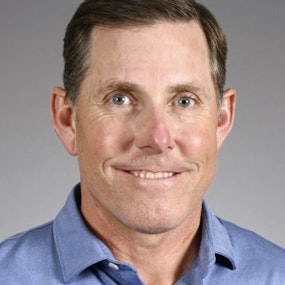
Leonard, Justin
Golf Professional and Broadcaster
Justin Charles Garrett Leonard (born June 15, 1972) is an American professional golfer. He has twelve career wins on the PGA Tour, including one major, the 1997 Open Championship.
Early years
Born and raised in Dallas, Texas, Leonard graduated from Lake Highlands High School in 1990. He attended the University of Texas in Austin and was the individual NCAA champion in 1994. Leonard won the 1992 U.S. Amateur, was a two-time All-American (1993, 1994), and won the Haskins Award in 1994 as the most outstanding collegiate golfer. That same year, he became only the fourth player to go directly from college to the PGA Tour without going through Q School, following Gary Hallberg, Scott Verplank, and Phil Mickelson.
PGA Tour
Leonard's wins on the PGA Tour included one of golf's four majors, the 1997 Open Championship, as well as the 1998 Players Championship. He ranked in the top 10 of the Official World Golf Ranking for 24 weeks in 1998 and 1999.[2] Leonard also had opportunities to win other major championships, notably at the 1999 Open Championship and the 2004 PGA Championship; in both instances he fell into a playoff with a bogey on the 72nd hole.
At the 1997 PGA Championship, Leonard was tied with Davis Love III for the 54-hole lead. Love shot a final round 66 to win by five shots over Leonard, who finished solo second. Leonard was ahead by three shots at the 54-hole mark of the 2002 PGA Championship before shooting a final round 77 and finishing tied for fourth.
Leonard qualified for the United States Ryder Cup team in 1997,… Read More
New to FORE the Good of the Game?
Here are some great episodes to start with. Or, check out episodes by topic.














